Please introduce yourself.
My name is Koshika Krishna. I am 24 years old. I am a lawyer and social activist from India. I did my undergraduate degree in law (Bachelor of Legal Science and LL.B) from Mumbai University. I am currently pursuing my masters (LLM) degree in Human Rights, Conflict, and Justice from the SOAS University in London, United Kingdom. I am also the recipient of the ‘Global Impact Award Scholarship’ at SOAS.

What three adjectives would people use to describe you?
Passionate, Driven, and Hardworking.
What is your favorite book and why?
I Too Had a Dream by Verghese Kurien is one of my favorite books. This is the autobiography of Dr. Kurien, also known as the ‘Milkman of India.’ The book chronicles one of the largest milk cooperative movements in the world. It made India the largest producer of milk and has provided livelihood and dignity to millions of milk-producing farmers. It is a story of passion, vision, and resilience. It is very inspiring and I love that it is grounded in a community-driven grassroots movement.
What inspired you to start your social entrepreneurship journey?
I have been involved in social entrepreneurship for over 6 years now. My journey into this space began at the age of 18 when I started filing Right to Information applications with various public departments on the crucial issue of safety and security against man-made disasters like fire, riots, and terrorist attacks in the city of Mumbai. I presented this issue before the State Information Commission and the learnings I had through these interactions with such senior officials—holding them accountable and demanding answers—inspired me to pursue more such issues.
I believe the most profound experience throughout my journey was when I was standing before a judge and witnessing eight senior public officials being questioned by the court about their failure to perform their statutory duty. This incident inspired me and I realized the power that each of us has to create change.
This motivated me to pursue further work in human rights and I, therefore, started providing socio-legal aid to victims of domestic violence and sexual abuse through a prominent Mumbai-based NGO. While there, I observed the stigma around a woman’s body and the restrictions they face in accessing basic rights, such as information, healthcare, and bodily autonomy. Many myths have been attached around menstruation in particular. Many Indian communities believe that menstruating girls and women are unclean and impure and they are therefore forbidden from entering the kitchen, praying in temples, or playing. Some women are also made to sleep in separate rooms and eat with separate utensils. Stigmas such as these create a very hostile environment and restrict women from enjoying basic amenities or even discussing reproductive health issues with healthcare professionals, which means they often continue to suffer and refuse medical aid.
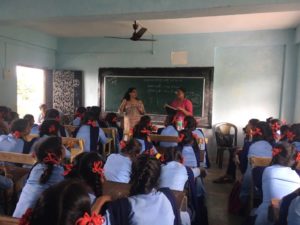
How did you launch your social venture?
I launched my social venture, SEHER, to address these stigmas and misconceptions. SEHER was initiated after I won the Social Venture Challenge organized by The Resolution Project at Harvard University’s WorldMUN conference in Montreal, Canada in 2017. With the support of Resolution, SEHER has today impacted the lives of over 8,000 women and girls across Maharashtra. Over time we diversified and also began to engage in legal intervention on public interest cases at the National and (Maharashtra) State Human Rights Commission. I currently deal with numerous cases through these forums, including; right to life, custodial violence, medical negligence, and tribal rights. Some of my successful orders are on the right to clean, potable drinking water for the residents of city Mumbai and on expedited pension process for more than 4,000 district level folk artists. For my work around social and legal change, I was also awarded under the Top 25 category at the national level fundyourownworth campaign in 2018 by the ICICI Bank.
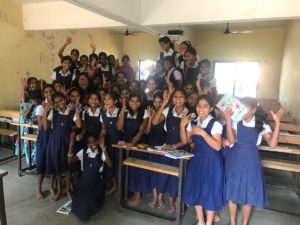
What is the challenge your venture seeks to address?
My venture works on two key issues. One is addressing menstrual health and nutrition levels among girls and women through advocacy workshops in collaboration with village councils, district collectors, and other civil society organizations. The second is addressing various human rights violations through strategic litigation at the National and State Human Rights Commission.
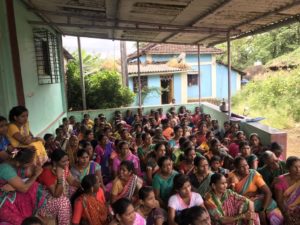
How is your venture addressing these challenges?
We conduct advocacy sessions on menstrual health and nutrition that encourage participants to question the stigmas and the myths that are attached to this issue. Our interventions ask village councils and local doctors to take initiatives such as monthly check-ups, proactively organizing more community workshops around maternal care and adolescent health. We also work with villages to form better sanitary napkin disposal mechanisms to reduce waste and public health risks from pads being thrown in open landfills. Our focus throughout our interventions is on sustainable menstrual products.
The legal intervention that was actually born from our experiences on the ground while conducting the workshops has helped us to create deeper impact by undertaking more policy work. One of our petitions at the National Human Rights Commission led to an immediate positive effect. In this case, a village in Uttarakhand had allotted funds given for welfare development for building a room to home women of the village in while they were menstruating. Following our application, the NHRC launched an inquiry. This eventually resulted in the District Collector/ Magistrate working with the village council to instead converted the room into a community center for women where plans are being made to conduct periodic workshops and programs around better health, sanitation, and mental well being.
What does your venture hope to achieve?
We hope to start meaningful conversations through our advocacy sessions around the issue of menstruation. We want to build sustainable communities in these villages where women can come together to discuss these practices and unlearn the stereotypes, myths, and stigmas that have been attached to this normal physiological process. Through our legal intervention, we are hoping to create effective policy-level changes. For instance one of our latest success stories involves getting the Municipal Corporation of Mumbai to introduce internal policy changes in their supply of potable drinking water to the city. Eventually, we were able to get the court to take action against errant officials, set out in-house guidelines to prevent such incidences in the future, and to inquire into the health hazards suffered by the residents and to accordingly award monetary compensation to them. The ripple effects of this case have now lead to the BMC conducting pipeline checks across the city, setting up a 24-hour complaint helpline, and issuing notices with claims that their water is safe for direct consumption and much better than even the WHO mandated standards.
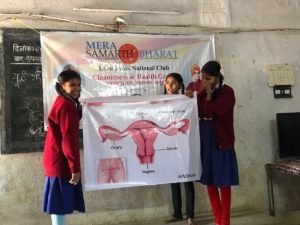
What inspired you to start your venture?
I have always been passionate about human rights and have wanted to work at the intersection of social and legal intervention. This venture gave me the right opportunity to pursue this. I believe it was also the realization that I had a lot more privileges than many other people in India and that this meant that I needed to exercise it to help those who didn’t have access to the same.
What excites you about the Resolution Fellowship?
The Resolution Fellowship is an incredible platform. Becoming part of this beautiful and motivating family has changed my life in so many ways! Resolution invests not just in ventures but in the people behind them. I think that is what truly drew me to this Fellowship—the energy and time they put into supporting their Fellows along with their ventures. The Fellowship taps into the unexplored potential that young individuals possess and—through mentorship—helps them refine that and create effective impact. Resolution believes in the power of the young to create change, not in the future but today and they help harness and hone that skill and power and provide platforms and opportunities for motivated youth to create effective social ventures. It is also so inspiring to be a part of a cohort with Fellows from across the world who are all working in different ways to address challenges in their countries.
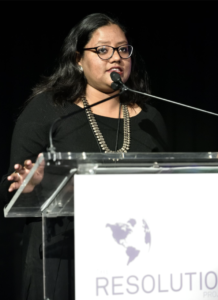
How will the Fellowship help you achieve your goals?
This Fellowship has given me the clarity and confidence I needed to decide what career path I wanted to pursue. While in law school, I was inclined towards public policy and human rights-based issues, but I wasn’t fully confident about this as a career path. The Resolution Fellowship was like a catalyst that set off a chain reaction, and building SEHER made me realize this was my passion and I wanted to be working in this area. This Fellowship has helped me transition from a bystander to the social challenges I witnessed, to taking proactive measures to address them in a sustainable and effective manner. Like a chain reaction, this project has inspired those associated with it to also work towards creating social change.
What advice would you give other college students who are looking to start their first social venture?
Just do it and stop overthinking about the HOW and WHY. Once you start, the opportunities will open up on their own. It is better to have tried and failed than to never have tried at all!
What do you love most about your home community?
I love the warmth and love with which they host us and the curiosity and happiness that I see in so many women once we get them to open up and start the conversation around their bodies.

What role do young leaders play in the world today?
I think young leaders play a huge role today. They infuse new methods of intervention and introduce unique solutions to the same issues just by virtue of not being molded in the same way as experienced leaders are. They are hopeful, optimistic, resilient, and much more open to creating disruptive interventions. I am constantly inspired by the journey of Greta Thunberg—she started off by sitting outside the Parliament with a simple cardboard sign that read ‘School strike for climate change’.
Why is it important for young people to focus on social impact?
Because we are the future.
What are your goals for the future?
I want to continue working on legal and social issues, public policy matters, and gender equality.
Tell us more about your work in response to COVID-19
My venture, SEHER, responded to COVID-19 in two key ways:
We organized a fundraiser along with two other activists to help sustain the activities of URJA NGO based in Mumbai. Urja works with homeless women and girls. They provide them with access to safe accommodation, medical aid, mental health counseling, food, and employment. Covid-19, however, reduced their funding avenues. The gendered effects of this pandemic also lead to increasing women seeking refuge at their shelters from domestic violence, lack of financial safety net, and other economic difficulties. When COVID cases started increasing in India they had 19 women at their shelter homes, however, in just another month they were housing more than 80 women and children. Through our month-long fundraiser, we raised over $6,721 and helped URJA cover 1/3rd of their emergency funds.
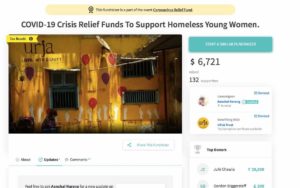
Secondly, we distributed over 1,000 biodegradable sanitary pads among tribal women and girls of Aarey Colony in suburban Mumbai. Aarey houses over 25 small villages with tribal families. Many of the women and men here are daily wage workers at small-scale industries or domestic household workers. With the COVID-19 cases rising in Mumbai, most of these people were fired or sent on leave from their jobs. Many families were therefore struggling to access food, medical aid, and clean water. SEHER collaborated with another not-for-profit, The Nazareth Foundation, to supply sanitary pads to the residents of this area.